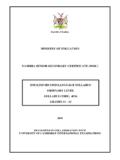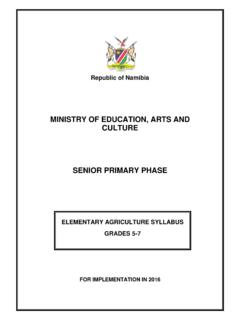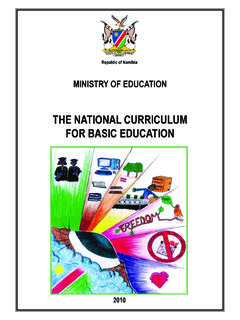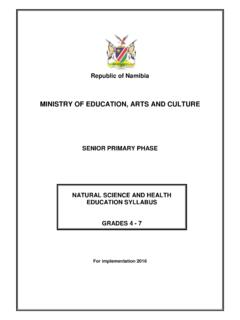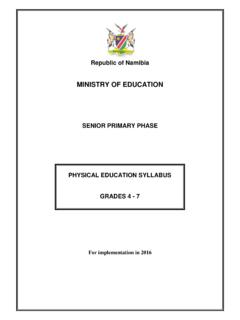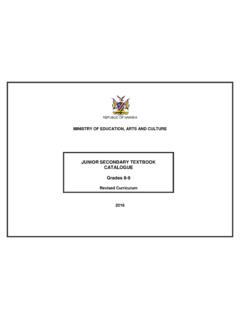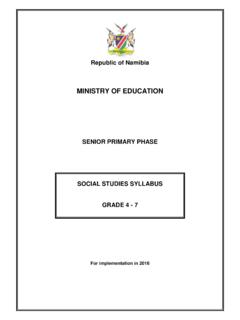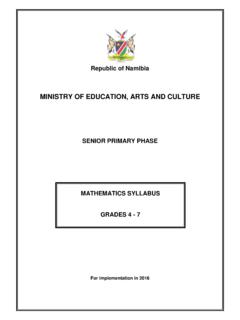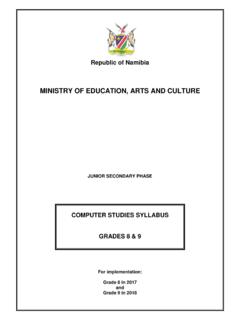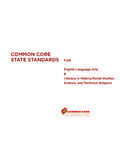Transcription of MINISTRY OF EDUCATION - nied.edu.na
1 Republic of Namibia MINISTRY OF EDUCATION UPPER PRIMARY PHASE JUNIOR SECONDARY PHASE SENIOR SECONDARY PHASE 2009 NATIONAL SUBJECT POLICY GUIDE FOR ENGLISH SECOND LANGUAGE GRADES 5-12 MINISTRY of EDUCATION National Institute for Educational Development (NIED) Private Bag 2034 Okahandja Namibia Copyright NIED, MINISTRY of EDUCATION , 2008 National Subject Policy Guide for English Second Language Grades 5-12 ISBN: 0-86976-947-2 Printed by NIED Website: Publication date: 2008 TABLE OF CONTENTS 1 INTRODUCTION.
2 1 2 AIMS OF THE NATIONAL SUBJECT POLICY GUIDE .. 1 3 SUBJECT-SPECIFIC ISSUES .. 1 The Composition of Phases and Appropriate Grades .. 1 Timetabling .. 1 Syllabuses .. 1 Schemes of Work .. 2 Written Lesson Preparation .. 2 homework .. 3 Maximum Time on Task .. 3 Teaching and Learning Materials .. 3 Assessment .. 4 Marking and Moderation .. 4 Learner-Centred EDUCATION (LCE) .. 4 Continuous Professional Development .. 5 4 SUBJECT MANAGEMENT ISSUES.
3 5 Line Management .. 5 Monitoring Learners Written Work/ homework .. 7 Subject Meetings .. 7 Managing Subject/Phase Materials .. 8 The Advisory Teachers .. 8 Cluster Subject 8 Teachers Resource Centres (TRC) and School Library .. 8 School-Based Studies .. 8 5 OPERATIONAL FILES .. 9 Preparation File .. 9 Administration File .. 9 Resource File .. 10 Subject File .. 10 Question Paper File.
4 11 Annexe 1: Example of Lesson Preparation Format .. i Annexe 2: Example of a Year Planner .. iii Annexe 3: Example of a Scheme of National Subject Policy Guide for English Second Language Grades 5-12, NIED 2008 11 INTRODUCTION Subject/phase teachers should regularly consult this document to ensure that they teach within the guidelines of the MINISTRY . The success of a teaching programme to a large extent depends on effective subject management.
5 The purpose of this subject policy document is to guide subject management in the school, but it simultaneously strives to leave scope for each individual teacher to take initiative, especially in presenting subject content and facilitating learning. This subject policy guide is applicable to English Second Language (ESL) in the Upper Primary, Junior Secondary and Senior Secondary phases in all government schools in Namibia. It is essential for subject teachers to consult the National Curriculum for Basic EDUCATION constantly to ensure that they teach within the guidelines of the MINISTRY .
6 Apart from the guidelines in this document, there are certain issues which will be dealt with in each school s own internal subject policy, guidelines concerning the submission of examination and test papers, moderation and typing of papers, etc. 2 AIMS OF THE NATIONAL SUBJECT POLICY GUIDE This document is the official subject policy guide for English Second Language. It makes provision for a well-organised and practically orientated programme in the teaching and management of English Second Language in the school and aims to.
7 Provide guidelines for subject managers in controlling teaching and learning activities guide teachers in organising their administrative duties and in planning teaching and learning to meet the expectations of the national standards and performance indicators 3 SUBJECT-SPECIFIC ISSUES The Composition of Phases and Appropriate Grades The time allocation for English Second Language is as follows: Grades 5-7: 7 periods per 5-day cycle Grades 8-10: 4 periods per 5-day cycle and 7 periods per 7-day cycle Grades 11-12: 7 periods per 5-day cycle and 7 periods per 7-day cycle Time tabling The number of ESL periods should be spread over the week.
8 Where possible, there should be a double period to be used for continuous assessment in the writing skills. Syllabuses A syllabus is a course description for a subject within the curriculum. It is a concise and general statement of intended learning which describes the following: the purpose of the subject - these are the rationale and aims which give the reason for and direction of the course National Subject Policy Guide for English Second Language Grades 5-12, NIED 2008 2 the content of the subject - this is described in terms of themes and topics.
9 In language syllabuses the language skills are the themes and topics objectives, defined in terms of what learning is intended to happen at the level of a subject competencies are the significant cognitive operations, skills, attitudes and values which all learners should be able to demonstrate, and which can be assessed assessment describes how learner achievement will be assessed and how the course will be evaluated [Please note: The terms General Objectives (for Objectives) and Specific Objectives (for Basic Competencies) are being used in Senior Secondary syllabuses].
10 Teachers should be well-acquainted with the syllabus content and teach the syllabus, not the textbook. All syllabuses of a subject/phase should be in the Subject File. However, only the syllabuses of the grades the teacher teaches should be in the teacher s Preparation File. Scheme of Work A scheme of work is used by the subject teacher to plan teaching and learning for the year and is divided into terms. The scheme of work must be developed from the syllabus and not from the textbook. If the syllabus changes the scheme of work must be adapted.
